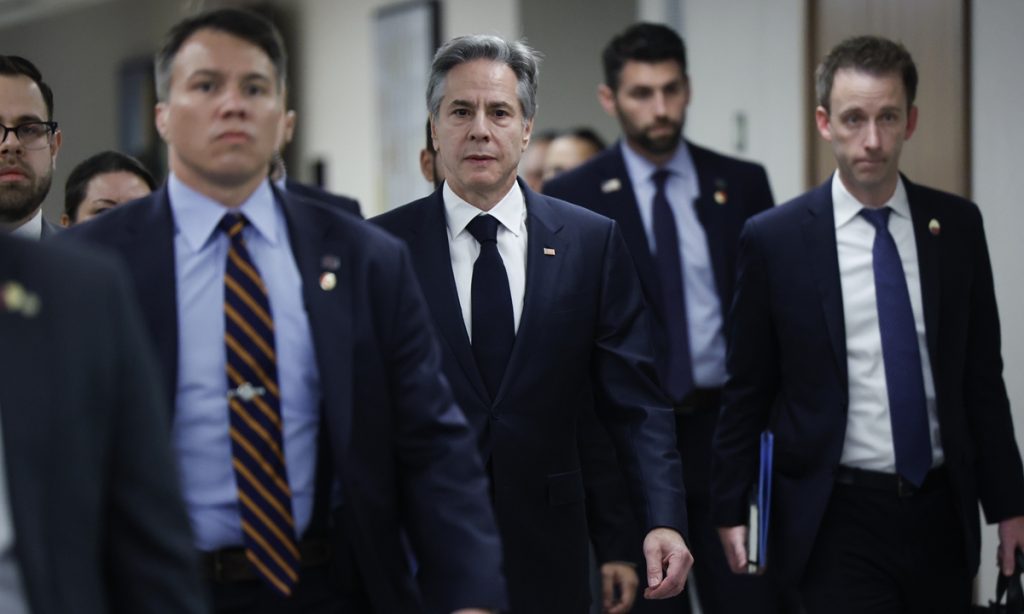Blinken's fifth Israel visit since Gaza war for diplomatic posture, rather than real mediation: experts

US Secretary of State Antony Blinken, after touring multiple Arab countries, is meeting Israeli leaders on Tuesday amid the enduring Gaza humanitarian disaster, Houthi attacks on Red Sea shipping and the escalation in hostilities at the Israel-Lebanon borders.
Speaking alongside Israeli President Isaac Herzog ahead of their meeting on Tuesday, Blinken said he would share what he had heard from regional countries during a day of meetings with Israel's government, including Prime Minister Benjamin Netanyahu, Reuters reported.
Blinken's agenda for his fifth Israel visit in three months includes discussing the next phase of Israel's military campaign and pressing on the protection of civilians, according to the US Department of State.
But Chinese observers have low expectations that Blinken's trip can help alleviate the tension, as Israel shows no signs of softening its military assertiveness while the US eyes a diplomatic posture rather than real mediation.
Since Friday, Blinken has visited countries including Turkey, Jordan, Qatar, the United Arab Emirates and Saudi Arabia. During the trip, he repeated multiple times the urgency of de-escalating the tension and discussed plans for the future governance of Gaza.
On Monday, Blinken said Palestinians "must not be pressed to leave Gaza" and he criticized "irresponsible" comments by some Israel ministers calling for people's resettlement outside the enclave, media reported.
Yet US calls may only get symbolic resonation from Israel as the two close allies are diverging wider and wider on Gaza and Middle East issues, Zhu Yongbiao, executive director of the Research Center for the Belt and Road at Lanzhou University, told the Global Times on Tuesday.
Israeli officials said the strikes in Gaza have entered a new phase of more targeted warfare, but there was no respite in the fighting on Monday, Reuters reported. "The fighting will continue through 2024," said Daniel Hagari, an Israeli military spokesperson, Reuters reported.
Sun Degang, director of the Center for Middle Eastern Studies at Fudan University, told the Global Times that Israel aims to use its recent victories as leverage to address security concerns in the north and potentially extend its military achievements.
The US has to deal with the presidential election this year and does not want the Middle East to take up too much of its attention from its competition with China and Russia, Sun said.
Zhu pointed out that under the US' guideline of withdrawing from the Middle East, Blinken's trip aims to display the US' diplomatic presence and fulfillment of responsibilities as Israel's ally rather than play a constructive role in mediation.
Therefore the US and Israel could showcase they have reached some consensus on non-significant topics, but that consensus can hardly have meaningful impact on the overall conflicts raging in the region, Zhu said.
In the latest sign that the war may be spreading, Israel killed a top commander of Hamas' ally Hezbollah in south Lebanon on Monday. It came after an attack in Beirut last week which killed Hamas leader Saleh al-Arouri, for which Israel did not claim responsibility, according to CNN.
Israeli Defense Minister Yoav Gallant warned on Monday that if Hezbollah is not deterred, Israel can "copy-paste" the Gaza war to Beirut. Gallant told media that his country was determined to end Hamas' rule of Gaza and deter other Iran-backed adversaries, Reuters reported.
Hezbollah has vowed revenge, and analysts believe there will be more rocket launches, but a "large-scale retaliatory assault" is unlikely as it is beyond regional forces' capacity and will.
However, the possibility cannot be ruled out that there might be actions internationalizing the consequences of the Israeli-Palestinian conflict, such as Houthi attacks on vessels in the Red Sea, Zhu said.